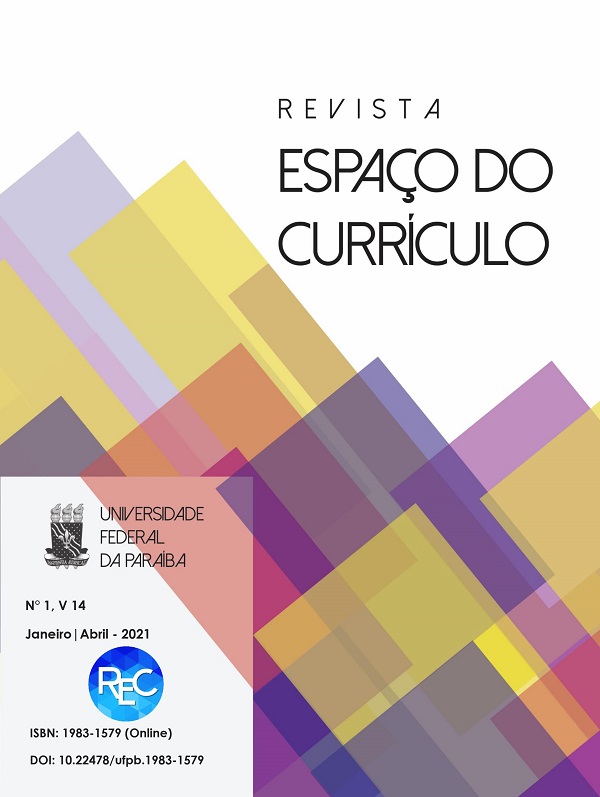FORMATIVE DEVELOPMENTS OF THE CURRICULUM PROPOSAL FOR EARLY EDUCATION IN PARAÍBA FROM BNCC
DOI:
https://doi.org/10.22478/ufpb.1983-1579.2021v14n1.57416Keywords:
Formation, Curriculum, Early Childhood Education, Teachers, PotiguarAbstract
The scientific paper problematizes the relationship between the construction of the Common Core Curriculum Proposal of the State of Paraíba – with emphasis on the stage of Early Childhood Education – and the formative effects generated during the construction of the referred proposal and also later on. It is based on the reflection of two official documents: the National Common Curriculum Base, approved in 2017, and the Common Core Curriculum Proposal of the State of Paraíba, which was approved in 2018. The Paraíba’s Curriculum Proposal was developed through the association of a team of coordinators and writers and strategies to expand interviewers, who contributed to the process through conversation circles, seminars, and online consultation. The organization of the team and the decisions taken by the team regarding theoretical and methodological consensus, as well as the inclusion of several interviewers during the process, contributed to the construction of the proposal to be characterized as a training process, which had concrete effects in the dialogue established between Potiguar teachers and the team that built the proposa: 1) the registration of fields of experience and, 2) The Curriculum Mapping. In the first case, a question was raised concerning the activities registering, made available by the state education department system. In the second case, the debate has been taking place in the field of the State Education Council. The relationship between curriculum and formation showed as narrow in the presented experiment and has proved a fruitful path in the debate involving broaden curriculum issues.
Downloads
Metrics
References
BRASIL. Ministério da Educação. Base Nacional Comum Curricular. Brasília: MEC, 2017. Disponível em: http://basenacionalcomum.mec.gov.br/images/BNCC_EI_EF_110518_versaofinal_site.pdf. Acesso em: 20 dez. 2020.
BRASIL. Lei n.13.005, de 25 de junho de 2014. Aprova o Plano Nacional de Educação - PNE e dá outras providências. Diário Oficial da União, Brasília, DF., 26 jun 2014. Disponível em https://www.planalto.gov.br/ccivil_03/_ ato2011-2014/2014/lei/l13005.htm. Acesso em: 15 jan. 2021.
BRASIL. Lei 12796/13 | Lei nº 12.796, de 4 de abril de 2013. Altera a Lei nº 9.394, de 20 de dezembro de 1996, que estabelece as Diretrizes e Bases da Educação nacional, para dispor sobre a formação dos profissionais da educação e dar outras providências. 2013. Disponível em? https://presrepublica.jusbrasil.com.br/legislacao/1034524/lei-12796-13. Acesso em: 15 jan. 2021.
BRASIL. Presidência da República. Resolução no. 5, de 17 de dezembro de 2009: institui as Diretrizes Curriculares Nacionais para a Educação Infantil. Brasília: MEC, 2009.
BRASIL. Constituição da República Federativa do Brasil de 1988. Brasília, DF: Presidência da República. Disponível em: http://www.planalto.gov.br/ccivil_03/Constituicao/ Constituiçao.htm. Acesso em: 20 dez. 2020.
PARAÍBA. Proposta Curricular do Estado da Paraíba, 2018. Disponível: https://sites.google.com/see.pb.gov.br/probnccpb/proposta-curricular-ei-e-ef. Acesso em: 20 dez. 2020.
LARROSA, Bondia, J. Notas sobre a experiência e o saber da experiência. Pro-Posições. Campinas. v. 26, n. (77), p. 223-239, 2002.
SANTOS, Sandro Vinicius Sales dos. CURRÍCULO DA EDUCAÇÃO INFANTIL - CONSIDERAÇÕES A PARTIR DAS EXPERIÊNCIAS DAS CRIANÇAS. Educ. rev., Belo Horizonte, v. 34, e188125, 2018. Available from http://www.scielo.br/scielo.php?script=sci_arttext&pid=S0102-46982018000100149&lng=en&nrm=iso. access on 26 Jan. 2021. Epub July 19, 2018. DOI: https://doi.org/10.1590/0102-4698188125.
SILVA, Tomaz Tadeu da. Documentos de Identidade: uma introdução às teorias do currículo. 3. ed. Belo Horizonte: Autêntica, 2011.
Downloads
Published
How to Cite
Issue
Section
License
Copyright (c) 2021 Curriculum Space Journal

This work is licensed under a Creative Commons Attribution 4.0 International License.
By submitting an article to Curriculum Space Journal (CSJ) and having it approved, the authors agree to assign, without remuneration, the following rights to Curriculum Space Journal: first publication rights and permission for CSJ to redistribute this article. article and its metadata to the indexing and reference services that its editors deem appropriate.
















